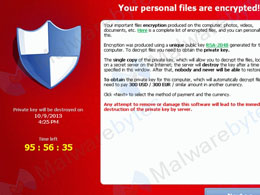
Dutch University set to recover more than twice the paid BTC ransom in 2019
The university reluctantly paid €200,000 in Bitcoin in December 2019 to avoid losing critical research data and resources. Netherland-based Maastricht University (UM) is set to recover nearly €500,000 worth of Bitcoin (BTC) after the police authorities managed to solve the infamous ransomware attack in December 2019.In 2019, a ransomware hack targeted the said university and froze all its research data, emails and library resources. The hackers demanded €200,000 in BTC and the university decided to pay the said amount fearing losing critical research data.The Dutch Public Prosecution....
Related News
A Canadian university has paid bitcoin to malicious hackers to restore its computer systems after it became the subject of a cyberattack that denied access to its data. The University of Calgary paid a ransom amounting to $20,000 Canadian dollars worth of bitcoins in order to obtain the keys or methods of decryption to restore its data. Linda Dalgetty, the school’s vice-president of finances and services, said in a message released on the UT website that the cyberattack, which crippled multiple systems on May 28, used ransomware, which locks or encrypts computer networks until a ransom is....
According to a cyber-security survey, 33% of UK companies are buying Bitcoin in anticipation of ransomware attacks. This comes after a Canadian university paid 20,000 Canadian dollars in Bitcoin for the encryption keys to their data this week. Canadian university ransomware attack. More than 100 of the computers at the University of Calgary had been infected with the ransomware, causing email and other files to become encrypted. After their IT department spent countless hours trying to find a solution to the attack, it was resolved that they would pay the ransom money of CAD $20,000 (USD....
As seen in the case of AA v. Bitfinex, targeting a crypto exchange over stolen funds is a high-risk, low-reward proposition. In October 2019, unknown hackers infiltrated a Canadian insurance company by installing the malware BitPaymer, which encrypted the firm’s data and IT systems. The hackers demanded a ransom of $1.2 million be paid in Bitcoin (BTC) in return for the decryption software needed for the firm to regain access to its systems. The firm’s United Kingdom-based insurer — known only as AA — arranged to pay the BTC ransom, and the firm’s systems were back up and running within a....
Europol, the Dutch national police, McAfee, Intel Security and Kaspersky Labs have spent this past summer helping victims of ransomware. Calling themselves the “No More Ransom Project,” the group helps people learn about ransomware and how to prevent it, as well as offering tools to help victims recover lost data. A Web Portal Dedicated to Preventing and....
TorrentLocker is one of the cyber world's most recent forms of ransomware, infecting several computer systems all over the globe and taking data hostage, refusing to release it unless a bitcoin ransom is paid. As of now, the primary victims appear to be countries in Europe. Nations such as Italy, Germany, France, Spain and the Czech Republic are on the list of prime targets, along with other nations such as the U. K., Australia and Canada. But a big shocker, however, is that out of approximately 40,000 victims only about 570 have ultimately paid the bitcoin ransom that TorrentLocker....





